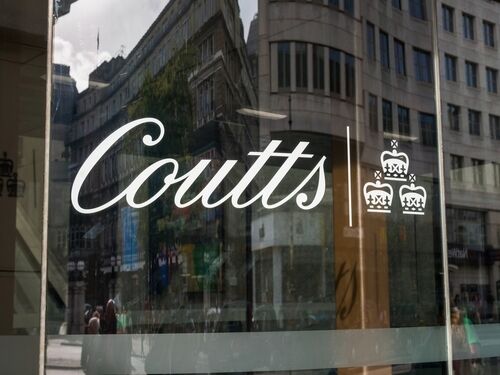Coutts Bank, Nigel Farage and Free Speech

This week saw Nigel Farage given an apology from the head of NatWest Banking Group after Coutts closed his account over his political views. In this long read, CARE's James Mildred explains why we should all find this really disturbing.
Have you ever had that feeling where you’ve tried to get away with something and been found out? For me, it’s a knot in the stomach and I usually feel sick. Thankfully, it’s not a regular experience! But it must be what senior executives at Coutts bank are feeling right now.
You see, a few weeks ago, Nigel Farage said Coutts, an exclusive, private bank owned by the NatWest Banking Group, had closed his account. The insinuation was that they’d done so simply because they didn’t like his political views. If, and perhaps at first it was just an ‘if’, this were true, it would be outrageous. Banks are private companies wh offer a vital public service. They don’t exist to make moral assessments of a customer’s political views because, self-evidently, this would be disastrous and seriously undermine free speech.
So when a story quickly emerged with the BBC which suggested we’d got it all wrong and of course it wasn’t anything to do with Mr Farage’s views, I for one felt some relief. It was simply that he had insufficient funds in his account. This was the real reason the account was closed. Case closed. And yet another example of Farage’s somewhat desperate attempts to stay in the media spotlight.
Except this week we’ve learnt that when Coutts told the BBC it was all to do with how much money he had in his account, that this was actually a lie. Or, at best, was being somewhat economical with the truth. It turns out that Coutts had closed his bank accounts after deciding his views “do not align with our values.” What’s more, Mr Farage was able to present proof.
Coutts had compiled an intense dossier on lots of his ‘unacceptable’ views. And the man who has revealed this dossier to the world? None other than Farage himself. He made what’s known as a subject access request and, hey presto! And, as you might imagine, he’s not been slow in letting everyone know just what he thinks about it.
And actually he’s been receiving plenty of support as well. During Prime Minister’s Questions on Wednesday (18 July), several MPs raised it in the House. The Prime Minister Rishi Sunak himself has tweeted about it and said "This is wrong. No one should be barred from using basic services for their political views. Free speech is the cornerstone of our democracy.”
In the end, NatWest, who own Coutts, actually sent a letter to Nigel Farage, apologising for 'deeply inappropriate' comments. The group’s head, Dame Alison Rose, said the comments in the dossier do not reflect the bank's view.
Reading the dossier it comes across as both bizarre and disturbing. Bizarre because it made me wonder if they do this for all their clients? It’s the kind of creepy, ‘big brother’ style surveillance you’d expect in Communist China, not the UK.
But also it was highly disturbing. The dossier presented things like Mr Farage’s comments about lockdown, about the covid-19 jab, about Brexit, about immigration. Now of course, you can question his position on all those things. But does it justify closing his bank account?
So what does the dossier say? For the sake of brevity, I’ll just summarise.
- According to the dossier, the key risk for Coutts of continuing with Nigel Farage (NF) are: reputational risk because NF is ‘high profile’ and ‘actively courts controversy’. The bottom line is that having Mr Farage as a customer was "not consistent with Coutts's position as an inclusive organisation". This was especially so, given his "publicly stated views".
- It then goes on to highlight examples of adverse press. For example, it points to examples where NF has been accused of inciting racial hatred. It also cited the time NF left his LBC radio show after comparing Black Lives Matter protestors to the Taliban.
- It also highlights alleged links to Russia and his ‘climate denying’ and anti-net zero views. It even includes examples like NF saying we should leave the European Convention on Human Rights.
- The dossier mentions Mr Farage's retweet of a Ricky Gervais joke about men who identify as women and his 'friendship' with Novak Djokovic, who opposed covid jabs.
Sadly, this is not an isolated incident.
For example, there was a vicar who had his account frozen by the Yorkshire Building Society just days after he wrote to the bank to complain about its messaging over Pride Month.
Or what about Metro Bank who refused a coalition of parents a bank account. Their crime? They had ‘gender critical view’.
There’s also allegations that one bank closed the account of a journalist because she said publicly that a woman doesn’t have a penis.
Now all of this is highly disturbing for two fundamental reasons.
The first reason applies for everyone in society. Having a bank account is essential in the modern economy. The days of collecting wages from your employer in hard cash, are, for the most part, long in the past. You need a bank account in order to take your place in society. That’s exactly why the state legally obliges the biggest banks to provide Basic Bank Accounts for free, to anyone who needs them.
If your savings account is closed, you can of course simply move to another bank. But there’s a principle at play here. Banks are just that: banks. They exist to hold money on behalf of clients. They are not the moral adjudicators of what’s right and what’s wrong.
And there’s a second cause for concern and it’s more personal for Christians. Especially for those who want to take the Bible seriously as God’s inspired, inerrant, sufficient and authoritative (2 Tim 3:16) word. Because our views are shaped by God’s wisdom and God’s heart, we are increasingly out of step with where culture’s at, especially in relation to human identity and sexuality.
Given the evidence that on some occasions, banks are in the business of closing accounts based on differences of opinion, then it’s not hard to suggest this could soon start impacting churches, Christian charities and individual Christians as well.
In response to this story, Andrew Griffith, the Economic Secretary to the Treasury tweeted that ‘the privilege of a banking license in a democracy should imply a duty not to ‘debank’ because you disagree with someone’s views.” The Government has also acted quickly and new plans have been announced to force banks to explain account closures.
I think all of this reminds us that free speech, which is meant to be a fundamental British value (whatever that means!), is increasingly having conditions attached to it. If you buy into the liberal, progressive mindset, you need have no fear. But if you think different from the Metropolitan, liberal, progressive elite, that’s a different matter.
After all, those are deemed ‘fashionable’ causes. While, say, a pro-life group may well find themselves in a similar position to the vicar and Mr Farage. Why? Because they hold a position that is deemed ‘unfashionable’.
Let’s hope the new rules help prevent banks closing accounts over political views. Let's pray free speech will be upheld. And perhaps we need to start thinking about alternative structures. Maybe a group of Christians with experience in banking should get together and set up a bank specifically for Christians. We already have the Kingdom Bank, which exists to serve churches and congregations. Perhaps we now need one that will serve individual Christians too.






